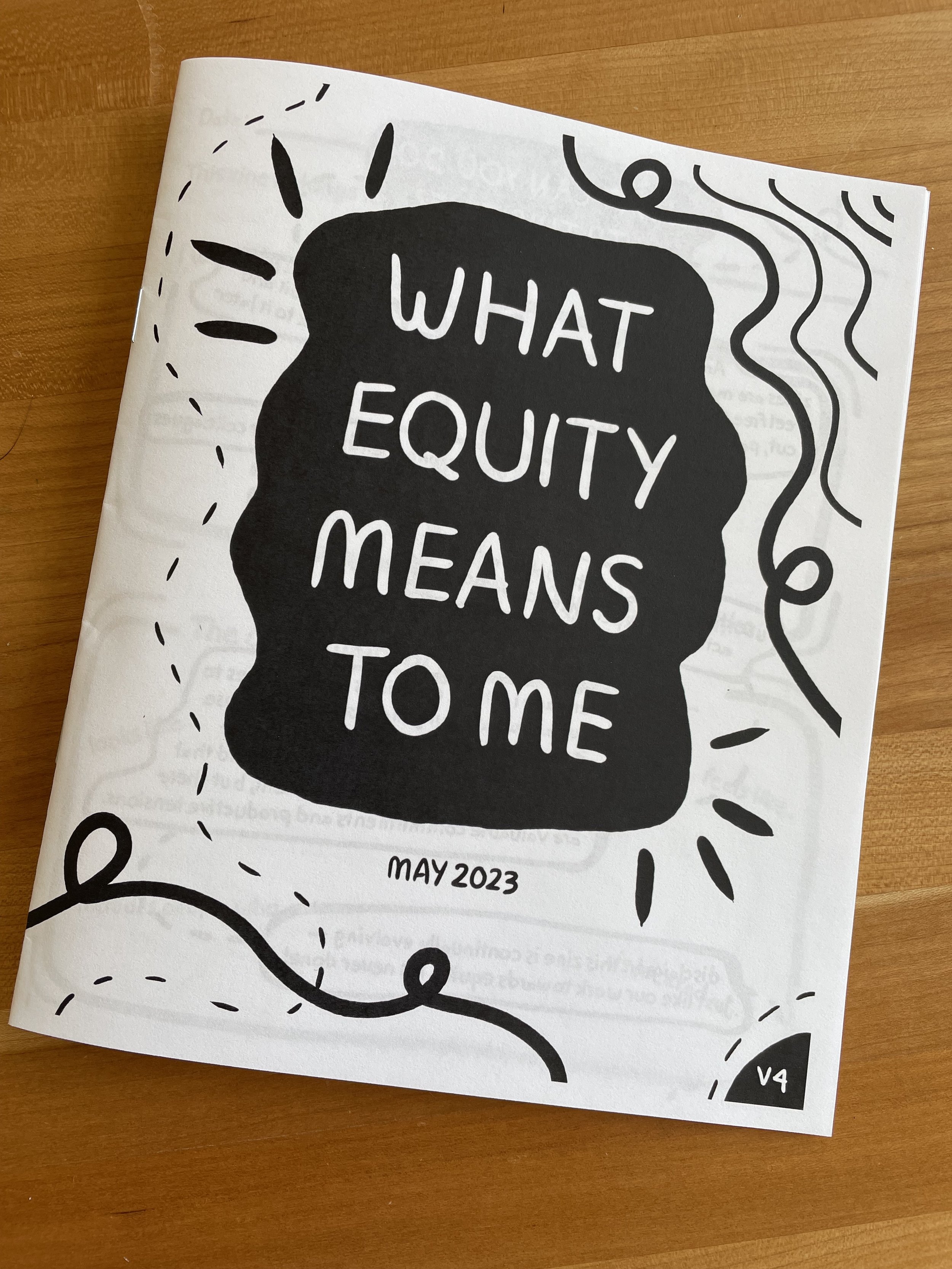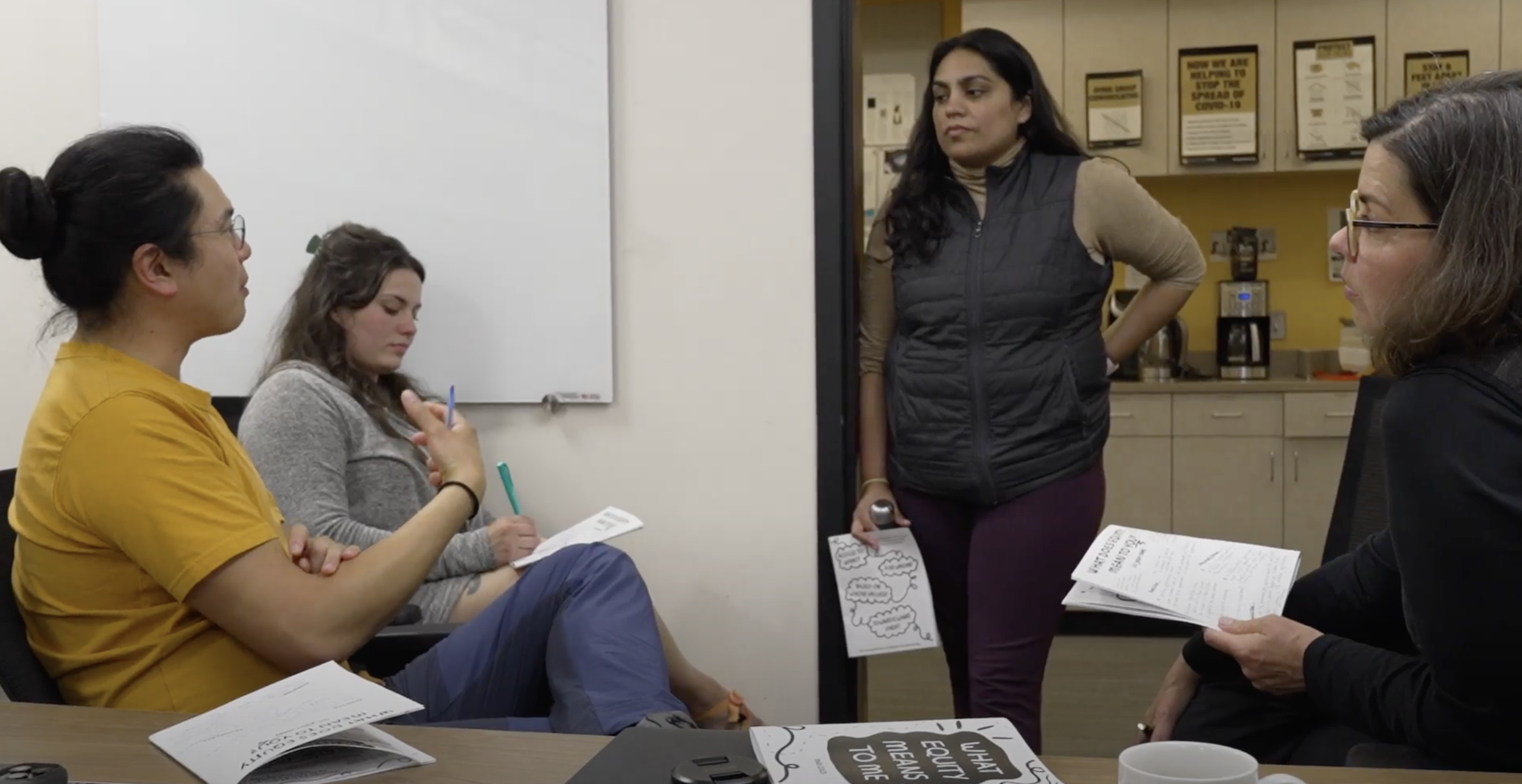Our team is excited to share a new resource for educators in the form of a zine called “What Does Equity Mean to Me"?” This zine is based on research our team conducted with informal learning educators, or facilitators, from 2020-2022. In addition to the zine, we made a facilitator guide for educators to use the zine with their peers to reflect on what equity means in their spaces and organizations together. The facilitator guide includes a sample workshop outline, facilitation tips, and other strategies that we’ve gathered from our experiences facilitating these sessions with educators. Check out the zine and the facilitator guide here.
Inside the zine, there are reflective activities that invite educators to engage in questions adapted from those originally posed by Shirin Vossoughi (2017) in her article titled “Access and Equity in Out-of-School Learning” to challenge equity-oriented educators and researchers to think beyond access and reflect on their own values, goals and positionality in their spaces. The guide and zine are free to access and shared under Creative Commons. We created this zine as part of our work on the Facilitating Computational Tinkering project with our project collaborators.
Why did we make this zine?
Facilitators play important roles in cultivating and sustaining equitable and creative learning environments. In addition to building knowledge and skills, facilitators also need professional development that supports them in challenging and deepening their ongoing equity-oriented work as the material, social, cultural, and political contexts of their spaces and communities change. We designed this facilitated discussion and reflection using a zine to support facilitators in reflecting on what equity means to them individually and with their peers and what it means for their practice and organization.
This zine was inspired by virtual interviews that our team conducted with educators in making and tinkering spaces within libraries, museums, and community centers in the fall 2020 and spring 2021. While the initial goals of our interviews were to ask educators about the challenges of incorporating computing into their spaces, we noticed educators making implicit and explicit statements about their equity work in their spaces. We recognize that these interviews were also conducted in the midst of a very fraught, uncertain, and violent time: the pandemic, anti-Asian hate, and the George Floyd protests. For many involved in these interviews, equity and justice were on their minds and what it meant in their roles and their organizations.
In reviewing these interviews, we noticed different conceptions of equity that varied across organizations and these varying conceptions highlighted different tensions and challenges. As we shared our interview findings with our educator partners, we noticed educators sharing additional reflections and responding to their peers’ reflections and tensions. We wanted to continue supporting these conversations with educators beyond the original interview study. We were preparing a workshop to present these findings to Clubhouse coordinators as part of their Annual Conference in Oct 2022. Instead of making presentation slides, we felt a zine could scaffold more participatory and multi-modal interactions. After trying out a version of the zine with Clubhouse coordinators, we were encouraged by the grounded and productive conversations that emerged between coordinators.
We continued to iterate on the zine based on feedback from our educator partners. We have shared our zines with the Lifelong Kindergarten research group at MIT, with ideaLAB makerspace educators from Denver Public Library, and the Tinkering Studio at the Exploratorium. We used these sessions to facilitate conversations about equity in their roles and work and also to get feedback on the format of the session and zine.
We hope this zine along with the facilitator guide can be a useful tool for you and your colleagues to ground your goals and conversations around equity in your practice. We would love to hear from your experiences!
Members of the Tinkering Studio, the Lifelong Kindergarten group, and the Creative Communities research group share their individual reflections on equity in practice with their small groups.
These materials are based upon work supported by the National Science Foundation under Grant No. (2005764).

